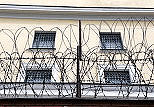Amnesty Report Slams ‘Repressive Legislation’

(Moscow Times – themoscowtimes.com – May 23, 2013) Amnesty International said Vladimir Putin’s return to the Kremlin was marked by large-scale attacks on freedom of assembly and of expression, resulting in a large number of politically motivated criminal cases and repressive legislation.
“Two new laws and 11 amendments to current legislation were made last year amid broadly weakened dissent,” head of Amnesty International’s Moscow office Sergei Nikitin said while presenting the report on Wednesday.
The two laws include the controversial NGO law requiring all nongovernmental organizations that receive funding from abroad and are engaged in “political activity” to register as “foreign agents,” and new legislation that allows authorities to shut down a web resource if they deem it harmful to public health. Both laws were largely opposed by human rights groups.
Amnesty International’s damning report also said that new and amended laws allowed authorities to use vaguely worded legislation to put pressure on opposition activists and encouraged excessive use of force by law enforcement authorities, who often remained unpunished for their illegal actions.
Amnesty International is known for its careful approach when naming those convicted for their views, and last year it added five names to its prisoners of conscience list, which previously featured only Mikhail Khodorkovsky and Platon Lebedev.
Nadezhda Tolokonnikova and Maria Alyokhina of Pussy Riot, as well as three participants of last year’s violence-tainted May 6 protest, were added to the list. Nearly 30 people were charged with using violence against police at that protest, though Amnesty International has called it a politically motivated case.
“We have very good grounds to consider at least three of those who are now awaiting trial to be prisoners of conscience; there is absolutely no evidence of their guilt,” Nikitin said, referring to Mikhail Kosenko, Artyom Savyolov and Vladimir Akimenkov, who along with many others have been in detention for over a year.
The report, which provides an analysis of the human rights situation in 159 countries, said refugees and migrants suffered most from human rights abuses around the world.
Russian citizen Alexander Dolmatov, who died at a Dutch detention center while awaiting political asylum, was cited specifically. Dolmatov fled to the Netherlands shortly after the May 6 protest over fears of being arrested in Russia for his participation in the rally.
Eduard Nazarski, Amnesty International Netherlands director, said Wednesday that the Dutch government completely failed to keep Dolmatov safe. He said his division of Amnesty International was closely following the investigation into Dolmatov’s death, which likely was a suicide prompted by the Netherlands’ refusal to grant asylum.
The report also noted that Russian authorities were not only violating human rights, but also making it impossible for rights activists to defend those being persecuted.
Natalya Taubina, head of the Public Verdict human rights group, said Wednesday that prosecutors were forcing the organization to register as a foreign agent because its lawyers helped those who took part in last year’s rallies.
She also said Russian authorities did not take their international obligations on human rights seriously, which allowed them to adhere to only internal rules that were often repressive.
“Russia does not implement the rulings of the European Court on Human Rights,” Nazarski said. “That diminishes the whole role of the body significantly.”
